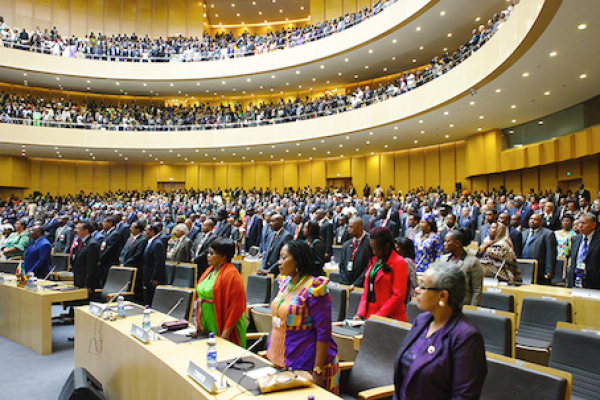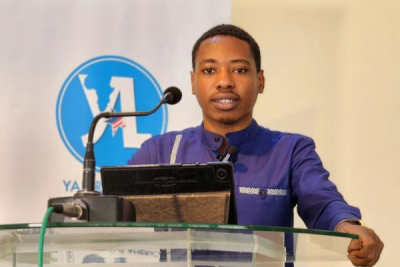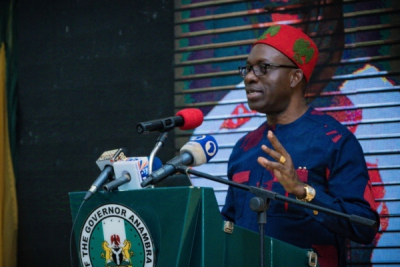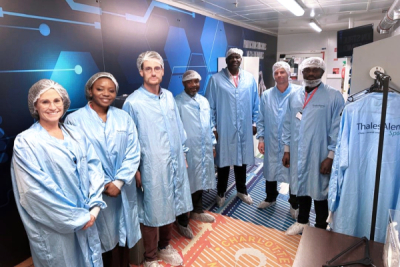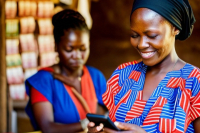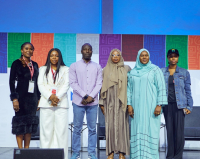African parliaments are increasingly turning to digital technologies to improve efficiency. However, the digital divide remains a significant challenge, hindering progress in many regions.
South Africa (8 out of 10), Zimbabwe (8), Burundi's Senate (7), Morocco (7), and Mauritius (7) lead the continent in digital maturity among African parliaments, according to a new report published in October 2024 by the Inter-Parliamentary Union (IPU), a global organization of sovereign state parliaments. The report is based on responses from 115 parliaments or chambers across 86 countries, as well as from supranational parliamentary organizations.
Titled the "World e-Parliament Report 2024," the report offers a comprehensive analysis of digital technology use in parliaments worldwide through a digital maturity index, an innovative benchmarking tool. This index assesses parliaments across six key areas: governance, digital strategy and management; infrastructure; parliamentary systems; user support; digital content and publications; and citizen engagement.
“The purpose of benchmarking is not to create a league table of ‘good’ or ‘bad’ parliaments. Rather, it supports strategic decision-making on the use of digital technologies by highlighting the factors that can affect maturity,” the IPU stresses.
In addition to the leaders, Tunisia (6), Burundi's National Assembly (5), and Malawi (5) stand out with scores of 5 or higher. However, sub-Saharan Africa remains underrepresented among the top performers. According to the IPU, 50% of parliaments in the region rank among the 30 least digitally mature institutions, a situation attributed to a lack of modernization initiatives, insufficient investment in new digital systems, and an absence of ambitious digital transformation programs.
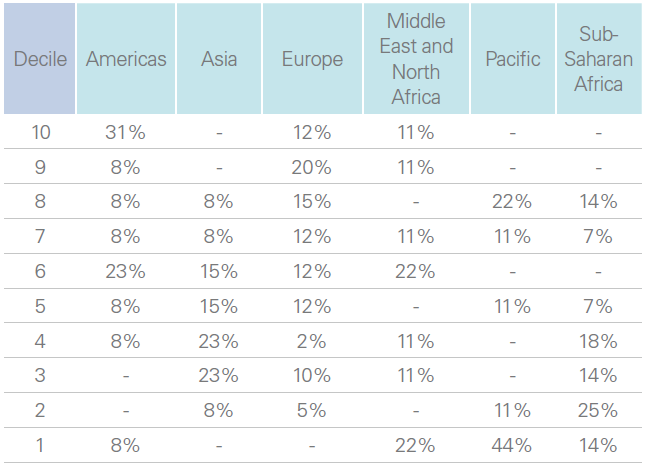
Distribution of parliaments by region for each decile ranking
At the bottom of the index, parliaments in countries like Djibouti, Lesotho, Madagascar, and the Central African Republic scored an average of 1 out of 10, reflecting significant gaps in digital adoption.
To address these gaps, the report recommends that institutions and governments develop clear strategic visions and comprehensive digital strategies; allocate adequate financial, human, and technological resources; establish robust governance frameworks; invest in capacity building; prioritize citizen participation; and strengthen inter-parliamentary collaboration.
Additionally, generative artificial intelligence is highlighted as a strategic lever to accelerate parliamentary digital transformation, offering the potential to deliver valuable insights and enhance the accessibility of parliamentary processes.
Samira Njoya
Lire aussi:
In recent years, ride-hailing services have gained popularity across Africa. In Nigeria, two tech entrepreneurs have decided to enter the market by offering luxury ride-hailing services.
Wenzo is a premium ride-hailing solution developed by a Nigerian startup. The platform, launched in 2023 by Precious Okafor and Gbenga Fola-Alade, Wenzo operates offices in Lagos, Nigeria; Accra, Ghana; and Dover, Delaware, in the United States.
It offers an iOS-exclusive mobile app, where users create an account to access the service. Based on their location and destination, they are matched with drivers ready to provide their rides. Notably, Wenzo collaborates with various leisure destinations from beaches to restaurants to enhance the experience for users headed to these spots in its service areas.
Beyond standard rides, Wenzo allows bookings for events, such as weddings, conferences, or tourist outings, providing transportation for guests or speakers to select venues. Since its launch, the startup has not conducted any fundraising to fuel its growth.
In October, it was selected as one of ten early-stage startups to pitch at Angel Fair Africa in Nairobi, Kenya. Organized by Chanzo Capital in partnership with Startupbootcamp AfriTech, MEST Africa, Antler, iHub, and GrowthAfrica, the event offers Wenzo a chance to capture investor interest for potential future funding rounds.
Adoni Conrad Quenum
He has over seven years of experience in IT, project management, business development, and operations. He leverages technology to advance education in Africa, making it more accessible for everyone.
Pacifique Nezerwa (photo) is a Rwandan social entrepreneur and tech innovator. He is the founder and CEO of Nelevat, a startup describing itself as a “social edtech enterprise” dedicated to raising education standards and empowering learners to unlock their full potential.
Founded in 2023, Nelevat offers a wide range of educational resources, interactive activities, and instant feedback to help learners progress effectively. Its online courses feature engaging content and assessments to measure participants' understanding and advancement. The startup also provides valuable data insights to enhance the learning experience.
Nelevat tailors its digital training programs to suit various learner profiles. The company believes that “With good Education and the right Technology, people and institutions today can still solve hard problems and change the world for better.”
Nezerwa holds a bachelor’s degree in information technology from the University of Kigali in Rwanda. His professional career began in 2019 at Hamwenawe Group Ltd, an online broadcasting company, where he worked as a digital data administrator. In 2022, he joined the Kenyan logistics startup Amitruck as a depot supervisor in Rwanda.
In 2021, he served as a web developer at WKS Trading, a company specializing in trade, maritime transport, and freight shipping. In 2023, he partnered with DIFFvelopment, an organization dedicated to strengthening skills among young Black talent, as an operations consultant.
Melchior Koba
A trained computer scientist, she has several years of experience with tech companies in the United States. She now leverages her expertise to support businesses and brands worldwide.
Stéphanie Assi (photo), an Ivorian entrepreneur specializing in technology, is the founder and CEO of Meraky Tech, a digital experience consulting firm that partners with global brands to drive innovation. Founded in 2019 and based in Montreal, Canada, Meraky Tech supports businesses in their digital transformation journeys by delivering tailored solutions. The firm stands out for its expertise in artificial intelligence (AI), web and mobile development, reputation management, data tracking and analysis, digital marketing, and UX/UI design.
In addition to its digital transformation consulting, Meraky Tech offers technology integration and digital project management services. In just five years, the company has completed over 700 digital projects, thanks to a team of more than 30 experts.
Beyond her work with Meraky Tech, Assi co-founded Moja Ride in 2017, an Ivorian platform that consolidates public and private transportation options onto a single digital interface. She served as the company’s Chief Technology Officer from 2019 to 2023.
A graduate of the University at Albany, United States, where she earned a bachelor’s degree in computer science, Assi began her career in 2010 as a web developer with the New York State Department of Motor Vehicles. She joined IBM in 2012 as a developer, and in 2014, she took on the role of Chief Technologist at Booz Allen Hamilton, an American IT consulting firm.
In 2018, she became Software Technical Lead at Accenture, a global technology company. Two years later, she was appointed Director of Engineering at IntelliBridge, while also serving as Technical Lead at Koniag, an American investment management company.
Stéphanie Assi's career reflects her commitment to leveraging technology for business transformation, both in Africa and globally, and her work continues to shape the digital landscape.
Melchior Koba
Anambra aims to integrate information and communication technologies across all sectors of the economy. It previously initiated projects to strengthen digital infrastructure, notably through a project to establish an Internet Exchange Point.
Anambra State, Nigeria, plans to develop its own data management platform as part of efforts to fast-track its digital transformation. With an estimated budget of 97.08 million naira (about $57,200), the project received approval last week during a State Executive Council meeting.
“By enabling better data integration across sectors, the platform will ensure that vital information is accessible in real-time for decision-makers, supporting data-driven governance,” said Law Mefor, Anambra’s Commissioner for Information.
The initiative is part of Anambra’s broader ambition to leverage technology to improve governance and drive development. Guided by its strategic vision, "Everything Technology, and Technology Everywhere," the state government aims to establish a digital economy that attracts investors, innovators, and businesses.
To achieve these digital ambitions, Anambra has been implementing various projects to upgrade its digital infrastructure. In August 2023, the state eliminated right-of-way fees to speed up fiber optic deployment. By July 2024, it had launched an extensive project to lay 2,400 kilometers of fiber optic cable, a move that supports its goal of providing free Wi-Fi across the state. Additionally, the government is planning to establish other essential digital infrastructure, including an Internet Exchange Point (IXP).
This data management platform is expected to contribute to Nigeria’s broader digital transformation, as Africa’s digital economy is projected to reach at least $712 billion by 2050—equivalent to 8.5% of the continent's GDP—according to a joint study by the International Finance Corporation (IFC) and Google. However, the timeline for the platform’s development and implementation has not yet been disclosed.
Isaac K. Kassouwi
Satellite technologies are becoming a strategic tool for nations looking to fast-track their digital development. In this context, access to advanced technologies is essential to meet the growing demand for connectivity.
Augustin Kibassa, Congolese Minister of Posts, Telecommunications, and Information and Communication Technologies (PT-NTIC), visited the facilities of satellite manufacturer Thales Alenia Space in France on Thursday. During his visit, Kibassa met with European company executives and toured the entire satellite production process, from design to launch. This visit aligns with the Congolese government's goal of developing satellite capabilities to meet a range of national needs.
Just two days earlier, on November 12, the Democratic Republic of the Congo (DRC) signed a memorandum of understanding with satellite operator Monacosat. This strategic partnership reflects the DRC's ambition to expand its internet capacity through various telecom technologies, aiming to deliver quality telecom services nationwide, including its most remote regions.
While the PT-NTIC ministry has not disclosed specific strategic goals for the Thales Alenia Space visit, the trip suggests potential responses to the DRC's previously expressed concerns about territorial surveillance. In 2022, the Congolese government announced its interest in acquiring a $100 million Earth observation satellite funded domestically. An official tender was issued by the Ministry of Scientific Research and Technological Innovation that November.
Whether for telecommunications or Earth observation, satellites represent high-value technology. For the DRC, which faces significant security and economic challenges, satellites could be instrumental in securing borders and localities against rebel groups, identifying areas affected by natural disasters, combating illegal mining activities, and assessing the condition of the country's critical infrastructure.
Samira Njoya
A computer scientist and trainer specializing in AI and machine learning, he is committed to solving problems, making a positive impact on society, and strengthening communities.
Emmanuel Acheampong (photo), a tech entrepreneur passionate about artificial intelligence (AI) and machine learning (ML), is the co-founder and CEO of yShade.ai, a startup focused on developing AI solutions. Founded in 2020 by Acheampong alongside Derby Chukwudi and Rofy Okyere-Forson, yShade.ai aims to address the needs of diverse skin tones and types through custom algorithms. These advanced algorithms enable accurate recognition, analysis, and matching of skin characteristics.
yShade.ai is built on a unique database containing over 10 million images and covering 100 different skin tones, which allows it to deliver tailored solutions for its partners. The technology also adjusts for variations in lighting and environmental conditions, ensuring precise and adaptable analyses.
In addition to his work with yShade.ai, Acheampong shares his expertise as an AI instructor on Maven, an online learning platform that offers courses in AI, marketing, design, and engineering. In 2020, he co-founded ROBO-Bootcamp, an educational platform that uses AI to address gaps in technical skills.
Academically, Emmanuel holds a bachelor’s degree in computer science and mathematics from Berea College (U.S.), earned in 2019, and a master’s degree in engineering, science, and technology from the University of Notre Dame, completed in 2021. Between 2021 and 2023, he also served as an instructor on Coursera, one of the world’s leading online learning platforms.
Melchior Koba
International money transfers play a key role in the global economy, facilitating financial exchanges worldwide. In Africa, the rise of mobile money has revolutionized these transactions, significantly boosting financial inclusion.
Mobile money transfers between countries were among the fastest-growing services in Africa in 2023. The total amount sent reached nearly $29 billion, a 33% increase from $22 billion in 2022, according to the GSMA.
In The State of the Industry Report on Mobile Money 2024 , published last April, the GSMA explains that this growth was largely driven by the Covid-19 pandemic. During this period, diasporas worldwide widely adopted mobile money transfers to meet the urgent needs of family members in Africa.
This practice, born out of the necessity for quick, secure, and affordable transactions, has endured, especially given the continent’s low banking rate. Mobile money has thus become a critical alternative to traditional banking services. International transfers via mobile money grew from $16 billion in 2021 to reach $29 billion in 2023.
In 2023, international mobile money transfers accounted for 3.18% of the $912 billion transacted through mobile money in sub-Saharan Africa. Although modest, these transfers play a vital role in the sector. Merchant payments, another significant component, reached $74 billion, or roughly 8.11% of the total mobile money transactions, up 14% from 2022. Additionally, transfers between banks and mobile money services (in both directions) rose 15% year-on-year, reaching $210 billion in 2023, according to the GSMA.
Challenges and Recommendations for Further Development
Despite this strong growth, the expansion of international mobile money transfers in sub-Saharan Africa faces structural challenges. One key issue is the relatively low adoption of mobile financial services, even though mobile phone penetration is high. In 2023, the region counted 856 million mobile money subscriptions out of 980 million mobile phone subscriptions.
To accelerate growth in this sector, the GSMA recommends increasing partnerships between telecom operators and banks to enhance interoperability and lower transaction costs. Meanwhile, governments could support these efforts by investing in digital infrastructure in remote areas and adopting favorable regulations. These actions would make mobile money services even more accessible, amplifying their impact on financial inclusion globally.
Samira Njoya
Africa hosts a growing number of startups fueled by increasing digitalization. However, many struggle to scale due to limited resources and mentorship. Targeted programs are essential to enhance their growth and competitiveness locally and globally.
The National Agency for Science and Engineering Infrastructure (NASENI) has partnered with AfriLabs to launch the NASENI Innovation Hub, aimed at empowering Nigerian innovators and startups. The partnership was forged at the 2024 AfriLabs Annual Gathering (AAG) held from November 5 – 8 in Cape Town, South Africa. It aims to bridge the support gap for young creators, providing resources to commercialize groundbreaking technologies and drive sustainable economic growth.
NASENI’s Executive Vice Chairman, Khalil Suleiman Halilu, emphasized the hub’s role in advancing Nigeria’s technological and industrial goals, saying: “At NASENI, we are committed to transforming Nigeria into a global leader in technology and industrialization. The establishment of this innovation hub marks a pivotal step in fostering homegrown solutions, nurturing local talent, and creating a dynamic ecosystem that will drive sustainable development through science and engineering.”
The hub will offer infrastructure, mentorship, and capacity building to nurture ideas, foster industrialization, and position Nigeria competitively in the global tech space. It will run specialized programs, including the NASENI Reverse Japa Programme, which supports Nigerian researchers abroad in commercializing innovations locally, and the DeltHer Expansion Programme, which empowers women in engineering. FutureMakers by NASENI will nurture young innovators through grants and mentorship, while the Placeholder Programme addresses public sector challenges with innovative solutions. NASENI Xceler8 will accelerate startups in science, engineering, and manufacturing.
Nigeria has a vast pool of talented innovators, but a lack of infrastructure, funding, and mentorship often stifles their potential. According to the Global Innovation Index 2024, which captures the innovation ecosystem performance of 133 economies, Nigeria ranked 113th, highlighting the urgent need for focused investment in science, technology, and innovation ecosystems.
This partnership establishes a foundation for a sustainable innovation ecosystem to drive Nigeria’s industrialization and economic transformation. By empowering innovators and fostering collaboration, NASENI and AfriLabs are building a future where Nigerian innovations thrive locally and impact the global stage.
Hikmatu Bilali
A young entrepreneur, she is fighting to reduce school dropout rates among African children. She offers innovative, tech-driven educational solutions.
Wiem Ben Mahmoud (photo) is a Tunisian tech entrepreneur and the founder and CEO of KidzRise, a startup dedicated to empowering children to actively contribute to their communities. Established in 2023, KidzRise uses an AI-powered detection system to identify and develop the unique talents and aptitudes of children between 5 and 17 years old. The company offers e-learning programs that transform these talents into concrete, marketable skills. KidzRise awards badges and certificates for achievements, aiming to make education more inclusive and equitable.
“At KidzRise, we believe every child is gifted. Each child has unique abilities and strengths that set them apart. Our mission is to uncover and nurture these hidden gems, ensuring each child reaches their full potential and shines in their own unique way,” reads the company’s website.
Wiem Ben Mahmoud graduated from the Institute of Higher Commercial Studies in Sousse, Tunisia, with a bachelor’s degree in business management and advanced commercial studies in 2021. She also holds a master’s in digital management and information systems, earned in 2022 from Esprit School of Business.
She began her career in 2016 as the media and communications manager for the Sousse International Festival. In 2020, she worked as a market research officer at Sarraj Immobilier before joining VERMEG for Banking & Insurance Software, a software provider for banks, capital markets, and insurance companies, as a business analyst in 2021.
Melchior Koba
More...
He has years of experience working in construction companies. With a focus on digital transformation, he helps modernize industry practices.
Nabil Hassoune (photo) is a Moroccan investor and serial entrepreneur, founder and CEO of GRO’INO, which connects construction industry operators with the supplies and services they need.
Founded in 2022, GRO’INO is a B2B e-commerce platform tailored to professionals in construction and hardware. It provides merchants with centralized access to a wide range of supplies, competitive pricing, and flexible payment options. The platform offers an extensive product selection, including paint, sanitary materials, and various plumbing and carpentry tools, all with delivery service included. For exclusive hardware and DIY manufacturers and distributors, GRO’INO serves as a direct sales channel, providing targeted marketing tools and payment terms not exceeding seven days.
Hassoune is also the founder and CEO of AXURYS, an IT services startup, and an investor in PECSYS France, a company specializing in IT consulting, services, and digital transformation.
In 2018, he founded Nomalis International Group, a startup he led until 2023. This company focused on digitizing processes like logistics, B2B marketplaces, and integrated financial and insurance services.
Hassoune graduated from the Ecole Nationale Supérieure d'Électricité et de Mécanique in Casablanca, Morocco, earning an engineering degree in mechanical design and manufacturing in 2001. He also holds a master’s degree in management from Ecole Hassania des Travaux Publics, obtained in 2014.
Before his entrepreneurial career, he worked from 2002 to 2004 as a B2B business development manager for southern Morocco at Total Petrochemicals. In 2004, he joined OCP Group, a fertilizer supplier, as operations manager. By 2012, he had become CEO of Prefamar SA, a construction materials manufacturer and distributor, while also serving as CEO of BigMat Morocco, a retailer selling construction materials.
Melchior Koba
Between 2022 and 2024, African countries saw their average scores on the E-Government Development Index rise by 4.8%, from 0.4054 to 0.4247. Djibouti is keeping pace with this trend, ramping up efforts to digitize as many services as possible.
Djibouti announced, on November 14th, the pilot phase of a digital building permit platform. The platform is designed to streamline and speed up the permit process for both individuals and businesses. This move follows the May 2024 announcement at the 8th session of the Council of Ministers, where plans for an e-permit system were first unveiled. The platform is set to integrate into the national online services portal, which already offers a variety of digital public services.
To support this initiative, the Djiboutian government has sought technical and financial partnerships. Earlier this week, they reached out to the European Union as part of the "Global Gateway" investment strategy. The e-permit implementation is part of the broader "Djibouti Digital Foundation" project, which aims to accelerate the country's digital transformation.
A United Nations report released in September categorized Djibouti as a country with a medium E-Government Development Index (EGDI), scoring 0.2911 out of 1. However, Djibouti's Online Services Index, a component of the EGDI, remains low at 0.2092 in 2024.
During the pilot phase, building permits will be issued within seven days, as stated on Djibouti's national online services portal. Applications can be submitted from Saturday to Thursday between 7 AM and 2 PM.
Adoni Conrad Quenum
An IT professional by trade, she is passionate about no-code development. She now uses this technology to create digital solutions in Madagascar.
Amboara Rabe-Harinoro (photo) is a Malagasy software developer and entrepreneur. She serves as the CEO of Misaina Incorporation, a company specializing in digital solutions.
Founded in 2017, Misaina Incorporation is an innovative startup in the no-code sector, providing solutions tailored to the specific needs of businesses. Its mission is to support the digital transformation of small and medium-sized enterprises (SMEs) and startups, allowing them to focus on their core activities.
Misaina Incorporation also offers no-code training courses aimed at entrepreneurs and freelancers, in addition to providing software development services.
In March 2024, Amboara Rabe-Harinoro launched NoCode Madagascar, the first no-code community in the country. She is also the lead developer of PayFacile, a platform that facilitates entrepreneurs' access to online payment solutions and subscription services. Simultaneously, she teaches software development at the IT University of Madagascar and serves as an IT consultant for BICI, a software development company.
She holds a bachelor's degree in computer science, obtained in 2017 from IT University Andoharanofotsy. She also graduated from Université Côte d’Azur, where she earned a master's degree in Mobility, Databases, and System Integration (MBDS) in 2019.
Amboara Rabe-Harinoro began her professional career in 2017 as a software developer at Madagascar Airport (ADEMA). In 2018, she joined BICI as a full-stack developer, where she also held the role of project manager. In 2019, she became a full-stack developer at iFox Code, a Mauritian mobile and web application development company, where she worked for three months.
Melchior Koba
In a context where access to technology remains uneven, countries are seeking innovative solutions to improve connectivity. International partnerships, particularly in satellite technology, are essential levers to bridge this digital divide.
The Democratic Republic of Congo (DRC), on Tuesday, November 12, signed a memorandum of understanding with Monaco's leading satellite operator, Monacosat, to expand satellite infrastructure in the country. The agreement, signed by Congolese Minister of Posts, Telecommunications, and Digital Economy Augustin Kibassa Maliba (photo, left), aims to bridge the digital divide in rural and remote areas.
The partnership will involve discussions to finalize the details of deploying a satellite telecommunications network in the DRC, leveraging Monacosat's satellite capacity. According to a statement from the Congolese Ministry of ICT, the initiative aims to bridge the digital divide in rural and hard-to-reach areas by leveraging Monacosat’s satellite capabilities to expand connectivity. “We have decided to work closely together and consult on matters of mutual interest, focusing on the deployment of a satellite telecommunications network in the DRC through the acquisition of satellite capacity from Monacosat,” the statement read.
This initiative aligns with DRC's “Horizon 2025” National Digital Plan, which seeks to develop a robust digital infrastructure to connect the country. It follows a recent cooperation agreement signed with the Polish government to support digital infrastructure expansion in the DRC.
Despite government efforts, the country continues to show low connectivity rates. According to the Congo Post and Telecommunications Regulatory Authority (ARPTC), as of June 30, 2023, only 30.79% of Congolese had access to mobile internet, and a mere 0.0174% had fixed internet access. The United Nations' latest "E-Government Survey 2024," published in September, highlighted this gap, noting that the DRC’s telecom infrastructure development index stands at 0.1591, well below the African average of 0.4534.
If negotiations succeed, Monacosat would extend its coverage across the DRC using its TurkmenAlem52E/MonacoSAT satellite, which already operates in Africa. This initiative could not only connect millions of Congolese but also facilitate access to education, healthcare, and digital public services, contributing to the country’s overall development. It could also help offset delays in the fiber optic network expansion, which is estimated to require nearly 50,000 kilometers of additional coverage.
Samira Njoya


